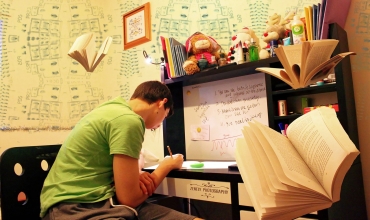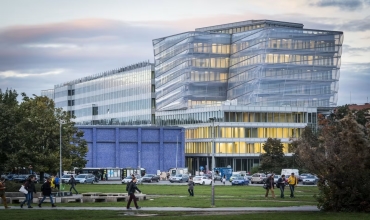More than a billion viewers in 187 countries across the globe
felt the power and energy of Ricky Martin’s electrifying
performance of “The Cup Of Life” at the 1999 Grammy
Awards ceremony; “La Copa de la Vida,” the official song of
the World Cup France ’98, has been a #1 single in more than
30 countries. That same night, Ricky’s latest full-length Latin
recording, Vuelve, won the Grammy for Best Latin Pop
Performance. With his magical career-defining performance,
Ricky Martin — an international superstar who has sold more
than 15 million records worldwide and packs stadiums from
Buenos Aires to Beijing to New Delhi and beyond– was
suddenly a recognizable name and presence in more than 24
million U.S. households. Ricky Martin, his first English
language album, is the next step in the evolution of this
remarkable talent.
“It’s all about communicating,” Ricky says by way of
explaining his decision to record in English. “I will never stop
singing in Spanish — that’s who I am — but this was always part
of the plan.” A labor of love and passion, Ricky Martin has
been two years in the making. “I was not going to release this
album until I was completely content with what I’d be
presenting,” admits Ricky, the consummate professional and
painstaking artist. “I want to listen to my music in 30 years and
say, ‘Great album!’ The time for this album is now, not
because I’m ready now and I wasn’t before, but because now
the music is ready.”
The first track off Ricky Martin is “Livin’ La Vida Loca,” a
sensuous celebration of life driven by a loaded rock bass line,
sexy-smart lyrics, raw vocals and pulsating rhythms.
According to Ricky, “that’s the single because I want to say,
‘Hey! Boom! I’m here! Check this out!’ The song has a little bit
of Latin, a little bit of ska, a little bit of rock, there’s even a
little bit of the ’60s, sort of a James Bond sound.”
Like the single, Ricky Martin explores an eclectic musical
range. “Yes, I come from Puerto Rico,” he says, “I grew up
listening to Boston, Cheap Trick, Journey, David Bowie. When
I was a kid, my brothers and I were all into rock, rock, rock.”
Ultimately, however, Ricky got a lesson in Latin music he
couldn’t ignore. “One day our mother got tired of rock,” he
recalls with a smile. “She said, ‘I can’t stand it anymore!’ and
grabbed us by the ears and took us to a Celia Cruz concert. It
really affected me.”
Today, Ricky says, “I listen to everything. I’m like a sponge.
I’m in this creative moment that feels like, ‘Let’s get it out!'” On
one end of the spectrum, Ricky delivers the stripped-down, yet
impassioned, sitar-laced “She’s All I Ever Had,” while on the
other there’s “Shake Your Bon-Bon,” a tantalizing Latinized
funk-rock-confection with hyper-horns, sly female background
vocals, and vocal hook that’s absolutely irresistible. Far less
libidinous, yet still sensual, is the soaring and imploring “I Am
Made of You,” Ricky’s favorite cut because it “describes
perfectly where I’m at today in my spiritual search.”
One track that’s bound to attract attention is “Be Careful
(Cuidado Con Mi Corazon),” a true summit meeting of
musical superpowers: Ricky Martin and Madonna. “People
said, ‘It won’t match! You’re Latin and the sound she’s working
in at the moment is very English-techno,’ but we felt we had to
do it,” Ricky says. “We didn’t want to think about deadlines or
why we were doing it. If it works for my album, great. If it winds
up on a soundtrack or something else, great. If it’s just for us
to go into the studio and have fun, great.” As it turned out, the
track blended the worlds of Latin music and electronica in a
groundbreaking techno-acoustic ballad and wound up fitting in
perfectly with the rest of Ricky Martin.
One of the unexpected stand-out surprises on Ricky Martin is
the sensuous “Private Emotion,” another duet, this one
pairing Ricky with the Swedish songstress Meja.
“I had the dream team!,” he enthuses about his producers:
Robi Rosa (with whom he’s been working for years); Emilio
Estefan, Jr. (the pioneer behind the “Miami sound”);
songwriter Desmond Child (best-known for his work with Bon
Jovi and Aerosmith but, as Ricky points out, is Cuban-born
and “very much in touch with the Latin sounds”); and, through
Madonna, electronica titan William Orbit. Other writers and
producers on the album include Jon Secada, George
Noriega, Juan Zambrano, and Walter Afanasieff.
The production values on Ricky Martin draw from, and
enhance, the roots of his music. “Technology is great and it
works so you use it,” Ricky admits, “but I also try to keep
things very simple. When it comes to music, you cannot pull a
whip on yourself. I don’t want my voice to sound too technical,
I want it to sound like me. The way I feel is, I don’t have to
sound perfect, but my emotion has to nail it. There’s nothing
scientific about it, it’s all about emotion. I let it flow. If it’s
real,
it stays.”
Ricky Martin was born and raised in San Juan, Puerto Rico,
where he first revealed his love of performing in school plays
and choir. At the age of six, he had already begun to appear in
television commercials, becoming comfortable with the camera
and maturing in his craft through acting and singing lessons.
When he discovered the Latin music sensation Menudo,
Ricky began to audition, but was at first rejected as being too
young. When he was finally selected to join the group, in 1984,
Ricky Martin was 12 years old.
After five years of nonstop work, tours, recording, and
rehearsing with the group, Ricky left in 1989, traveling first to
New York, to study and reflect, and then to Mexico, where he
worked as an actor and a singer. His first solo album earned
him eight gold records in Mexico, Chile, Argentina, Puerto
Rico, and the United States. After releasing his second album,
Me Amaras, Ricky moved to Los Angeles, where he became
an American television heartthrob in his role as “Miguel” on
“General Hospital.” He went on to appear as “Marius” in the
Broadway production of “Les Miserables.” His third album, A
Medio Vivir, was produced by Robi Rosa and KC Porter
(Bon Jovi, Boyz II Men, Richard Marx, Patti LaBelle), sold
more than 600,000 in six months, and was certified gold by the
RIAA on October 27, 1997. Vuelve repeated that success and
was RIAA-certified gold on July 7, 1998; to date, Vuelve has
sold more than 6 million copies worldwide. Most recently,
Ricky Martin can be seen on television commercials as the
spokesperson for Puerto Rican tourism.
Which brings things up to the Grammy performance that
rocked the planet. “I was more excited when I learned I’d be
performing than when I was nominated,” he confesses. “It was
the most difficult audience I’ve ever been in front of! Sting!
Madonna! Pavorotti! To get the acceptance of your peers
really means a lot.”
Not surprisingly, Ricky’s philosophy for making music is akin
to the effect he hopes to have on his listeners: “I want them to
feel free, liberated. I want them to be who they are with my
music.”
Ricky Martin marks the arrival of a superstar while signaling a
brand new era in Latin music, a time when the whole world is
“Livin’ La Vida Loca”!
RICKY MARTIN’s
LIFE OF LOVING AND LOSING
Нашли опечатку? Выделите и нажмите CTRL+Enter




